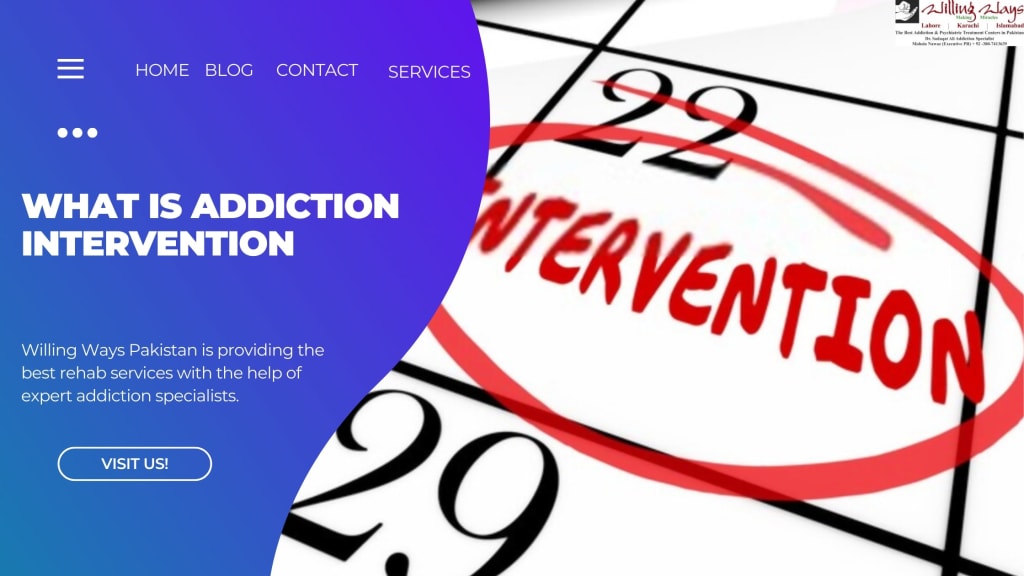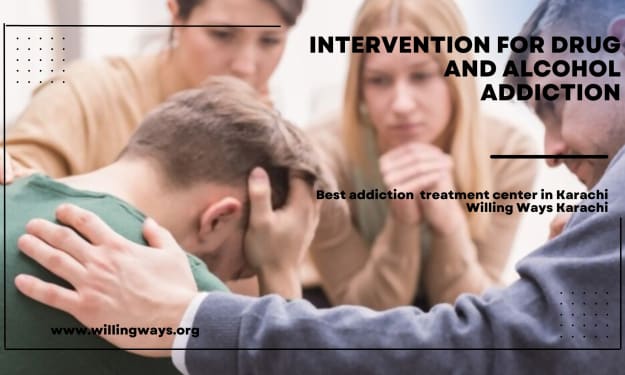What are Addiction Intervention
Intervention is the talking of between yourself and the doctor or the psychologists, it is a group talk.

At Willing Ways Pakistan rehab hospital provides intervention before the treatment of addiction at the best addiction treatment center in Pakistan. Professional addiction treatment doctors are providing addiction treatment. Many people do not know what addiction treatment is, and these people come and check with the doctors.
Enslavement mediation becomes a family's final hotel when dealing with a friend or family member dependent on medications and liquor who won't consent to find support. Medication and liquor fixation frequently accompany refusal for the benefit of the junkie or heavy drinker. Refusal is a piece of the illness of dependence and lets the junkie know that the person doesn't have an issue and is just doing what they should be OK consistently.
Dependence intercession is a pre-arranged endeavour by one or many individuals (family, companions, colleagues, neighbours) to get the junkie to look for proficient enslavement treatment, enter a medication recovery, liquor restoration, dietary problem, psychological well-being, or double conclusion treatment focus. Frequently mediations are held by relatives and dear companions and occur when other, more unpretentious ways to deal with getting help have been ineffective. By and large, there are two kinds of mediation - casual and formal.
Casual Intercession
A casual intercession is just a discussion you could have with the individual you are worried about and sharing a portion of your perceptions, getting clarification on some things, and recommending that (s)he look for qualified fixation treatment. Numerous casual mediations occur when a concerned companion, relative, or colleague worries about a junkie and doesn't want to incorporate others around them from dread of undesired strain between the fiend and others. Casual intercessions are a decent way for a companion or collaborator to secretly examine their interests with the fiend without including others. A simple mediation will probably positively impact the off chance it is arranged ahead of time and happens in a comfortable spot when the junkie is quiet and sober.
Tips for a casual intercession
- Get current realities about enslavement and liquor abuse.
- Find support for yourself - converse with somebody about your interests before the mediation.
- Pick the perfect environment (when the fiend is level-headed and in a quiet, confidential spot)
- Plan what you will say and intellectually set yourself up for the mediation
- Pass your friendship and regard on to that junkie
- Express your anxiety
- Utilize explicit instances of how dependence has affected the fiend's life
- Offer assistance - have numerous choices for finding treatment help accessible.
- Put down certain boundaries so you will, as of now, not be in an abnormal or empowering position.
- Try not to anticipate marvels if your mediation doesn't appear to have worked. Every outflow of concern works on forswearing, at last prompting the place where the fiend is not ready to overlook reality.
Formal Mediation
A conventional intercession includes a prepared proficient interventionist, going about as a facilitator and go between, who helps with an organized, pre-arranged discussion between the care group and the dependent individual during the mediation. This includes uniting a gathering with the fiend to investigate what their habit has meant for their lives. Conventional mediation is regularly utilized when the individual has more than once would not find support. The mediation is intended to get the individual to make substantial strides, address their enslavement issues, and get their consent to enter a dependence treatment program right away (for example, go for an assessment, go to directing, enter out-patient, in-patient, or a private dependence treatment focus).
Mediations have been utilized to resolve severe individual issues, including, yet not restricted to, chronic drug use, liquor abuse, impulsive eating and other dietary problems, fixation on sex, self-mutilation, "workaholism," tobacco smoking, misery, and numerous different kinds of emotional wellness issues. Mediations have likewise been led because of individual propensities not by and considerable thought to be hurtful, for example, computer game habits, unreasonable TV seeing, and excessive web use.
Formal mediations are either immediate, regularly including a confrontative (confrontative) meeting with the liquor or other medication subordinate individual (the most ordinary kind of intercession) or circuitous, including work with a mutually dependent family to teach them to be more potent in aiding the dependent person. In a comparative sense, direct intercessions will commonly be a sort of flashing treatment that highlights getting the reliant person into a medicine recuperation, alcohol reclamation, or subjugation treatment center program. In contrast, circumlocutory intercessions are undeniably an extended treatment of changing the commonly reliant family system.
The objective of a formal, direct mediation is to get the individual to consent to find support (go to a treatment community program) right away. Simply encouraging them to stop is certainly not an OK result. Members should illuminate the outcomes each will force if the individual denies treatment. These kinds of ultimatums can and frequently do have life-breaking suggestions, which is why including an expert interventionist is so significant.
Tips for a conventional intercession
Objective: to have the individual start treatment right away.
- Enroll an expert to assist with arranging the intercession.
- Unite individuals generally concerned and who have clout with the individual ( no kids).
- Have an arrangement - conclude who will express out loud whatever.
- Practice what you will endlessly express in a concerned, mindful, helpful way.
- Let the individual know that you care about the person in question; however, make sense of what you are worried about (use models)
- Make all courses of action for the individual to start treatment quickly following the mediation.
- Realize the protection subtleties and which medical clinic or therapy focus.
- Conclude what outcomes you're ready to finish if the individual declines habit treatment.
- Be ready to finish these outcomes assuming treatment is denied.
- Get a responsibility from the individual that they're willing to find support and get them there immediately.
About the Creator
Willing Ways
Willing Ways is the Best addiction treatment center in Pakistan. We are the pioneer in drugs & alcohol treatment centers with outstanding services and a history of 43 years. We deliver quality writing that is beneficial for you.






Comments
There are no comments for this story
Be the first to respond and start the conversation.